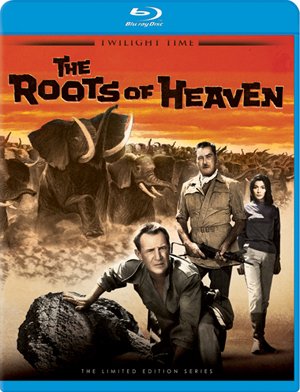
”They have to capture, kill, destroy everything — all that’s beautiful has to go, all that’s free. Soon we’ll be alone on this Earth with nothing else left to destroy but ourselves.” Those words, uttered by Trevor Howard towards the beginning of The Roots of Heaven are just as true today than they were in 1958 — as is the message of John Huston’s adaptation of Romain Gary’s novel, Les Racines du Ciel. Filmed on location in Chad (the very heart of Africa), the big-budgeted Twentieth Century Fox film from producer Darryl F. Zanuck focuses on an preservationist named Morel (Trevor Howard), and his efforts to ban the hunting and killing of elephants in French Equatorial Africa.
Naturally, the efforts of Morel — who was held as a Prisoner of War by the Nazis in World War II — to save the majestic creatures do not go over well with the local big-game hunters (one of whom is played by the great Herbert Lom). In fact, they just laugh at him. And so, the peaceful man has to resort to a more aggressive route: he shoots would-be elephant hunters in the ass. He even fires off a round into Orson Welles’ larger-than-life backside, who makes a cameo appearance as a TV broadcaster — and who promptly grabs a bottle of Vat 69 as soon as he shows up! Another heavy drinker (though the definition of “heavy” in this instance is a different one), Errol Flynn, gets top-billing here as a disgraced British army officer with an ardor for alcohol (and pretty much plays himself).
If you’re wondering why Flynn (who died a year after The Roots of Heaven was released) gets the big letters in the opening credits, it’s because William Holden was originally supposed to play Howard’s part — but had to bow out for contractual reasons. Now, let’s just stop to think about what would have happened had William Holden, Errol Flynn, John Huston, and Orson Welles got together — and how much booze would have flowed in the process. Why, there would have been a worldwide liquor drought for sure!
Moving back to the film itself, kids, our protagonist Morel quickly becomes something of a folk hero, amassing a small group of equally determined idealists, including a local nightclub’s hostess/on-site girlfriend-for-lease (Juliette Gréco, who later became Zanuck’s own girlfriend-for-lease), and the aforementioned dishonored soldier (Flynn). Several other parties join the club (Frederich Lebedur, Paul Lukas, etc.), with a journalist (Eddie Albert) showing up about halfway through the film to tag along so he can get a big scoop; timing on his part that couldn’t be any more ideal, as the now-angered hunters declare war on the conversationalists, leading to a fight that only goes to prove Morel’s philosophy on man.
Sadly, though, The Roots of Heaven has a tendency to falter with its delivery. It simply has more characters than it really knows what to do with, nor does it seem extremely certain as to how it should present itself at all times. Perhaps the intense heat the cast and crew met during the rugged shooting schedule combined with the frequent bouts with dysentery, malaria, and other tropical diseases many encountered resulted in the motion picture losing some steam. It starts off in an understandably idle enough mode, before revving its engines up — only to simply shut off long before the movie ends.
It’s a pity, too, as I was really hoping The Roots of Heaven would offer a lot more than it did. And, now that I’ve seen it in all its widescreen splendor, I can easily see why the film didn’t fare well with audiences of the ’50s. It’s still deserves a viewing, however, just so you can say “Yes, I see” or “No, I think it’s better than that, you fool.” Plus, it’s fun to show this one to Star Wars fans, as they’ll keep freaking out every time they hear an elephant call, expecting a TIE Fighter to swoop down (the sound of the noble mammal was used to create the roaring engines of the fantastical ship).
Although the movie didn’t impress me 100% fully, I have to commend the folks at Twilight Time for bringing this anonymous movie out of the dark and into the world for all to see (and judge). Like all of their previous releases (High-Def and otherwise), Twilight Time’s presentation of The Roots of Heaven is a beautiful one, boasting a robust transfer and a splendid DTS-HD Master Audio 2.0 soundtrack. There are no subtitles to be found here, and the only special feature consists of an isolated track featuring British composer Malcolm Arnold’s score (along with a few sound effects).